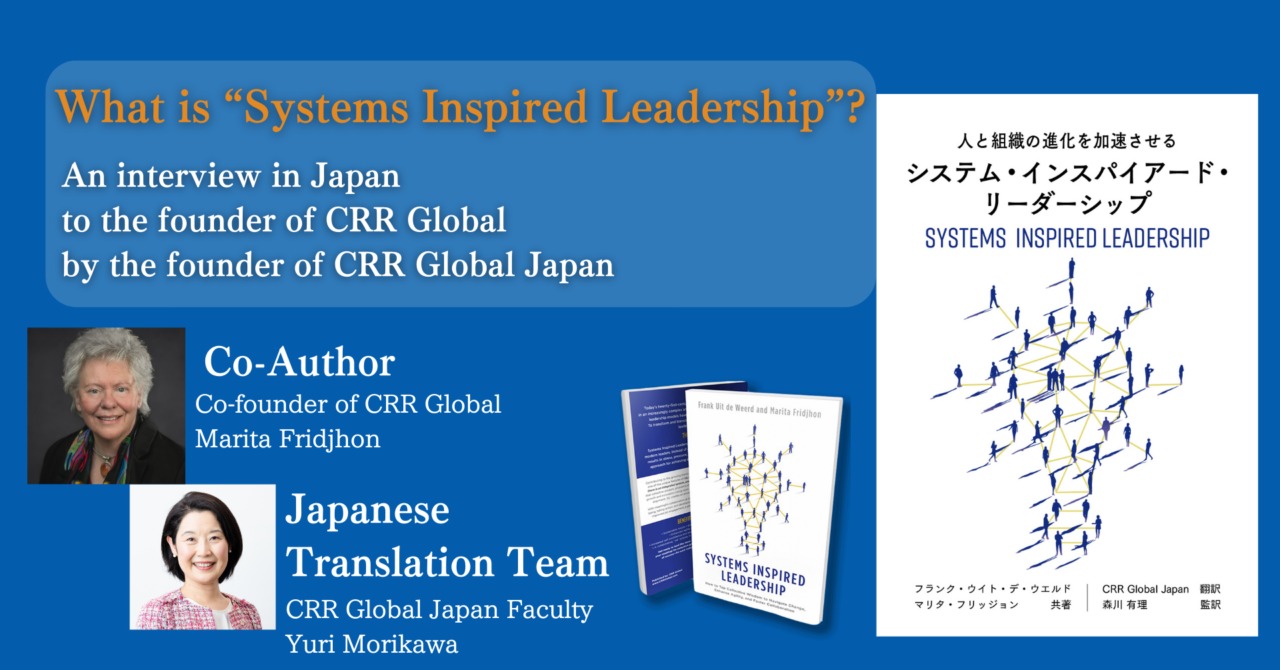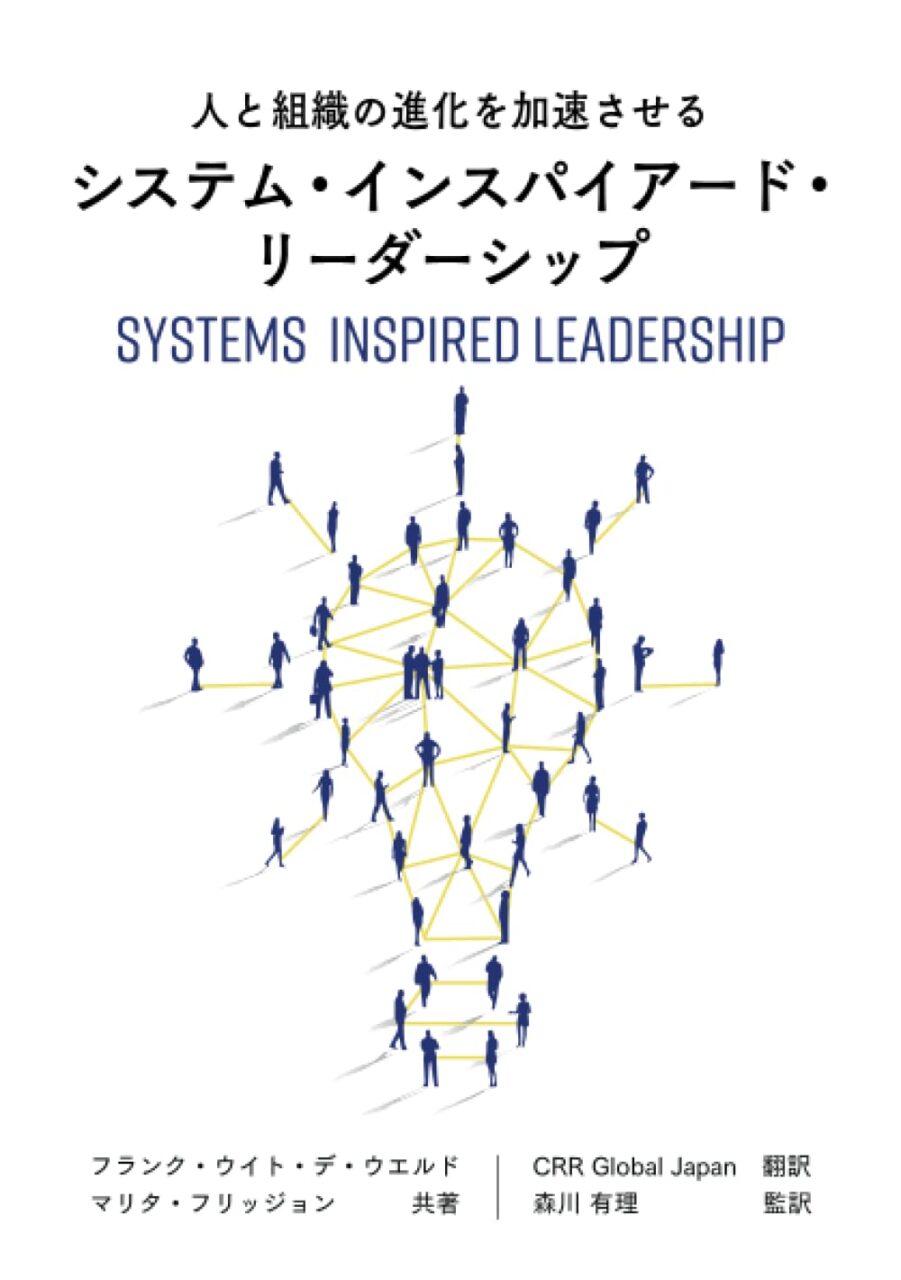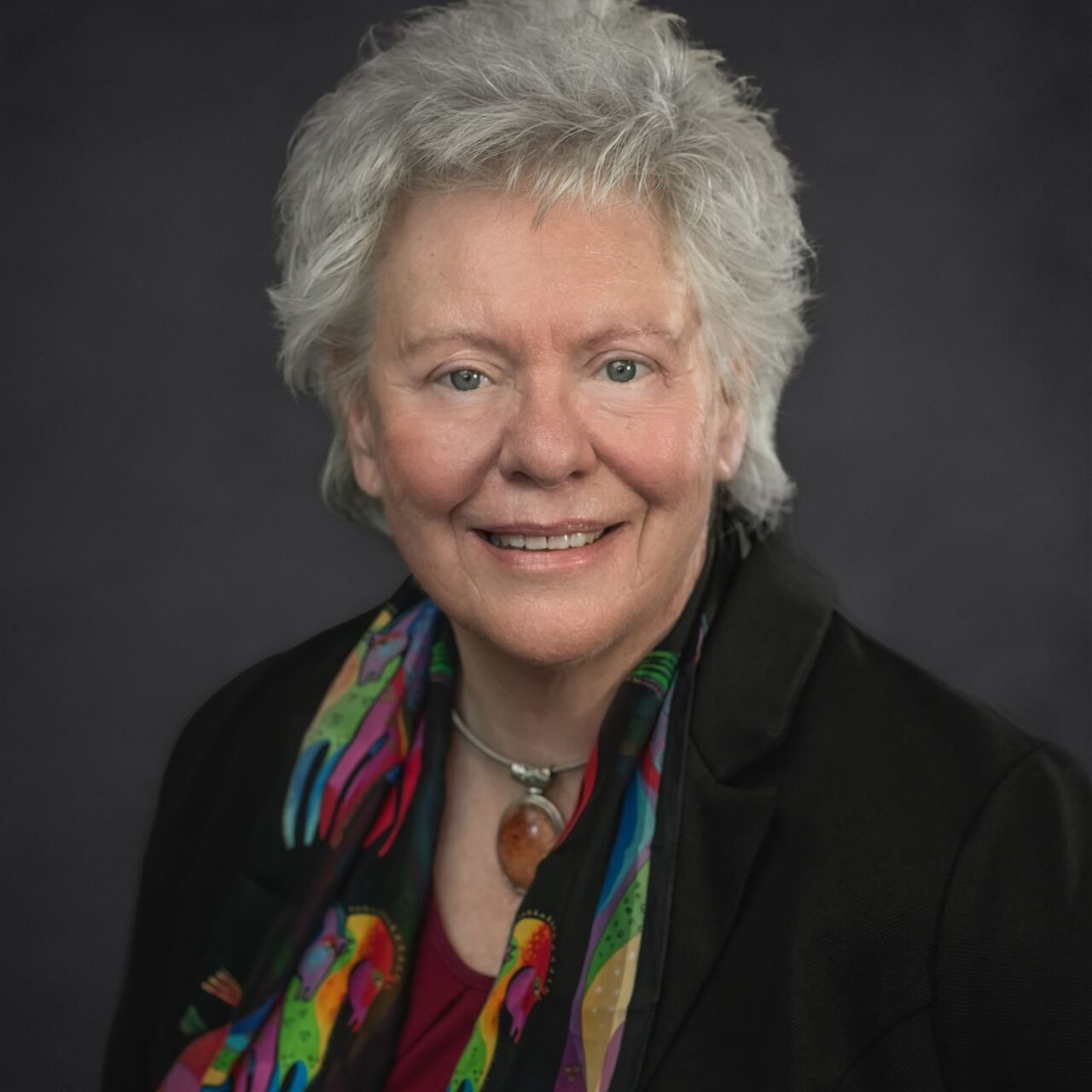The founder of CRR Global Japan, Yuri Morikawa interviews Marita Fridjhon, the founder of CRR Global about “Systems Inspired Leadership”

In the mid of May 2023, the Japanese version of a book “Systems Inspired Leadership”, a book on RSI (Relationship Systems Intelligence) was published in Japan.

And prior to the publication, Marita Fridjhon who is one of the co-authors of the book, as well as the co-founder of CRR Global gave an interview in front of people from Japan and Asia.
Interviewee was Yuri Morikawa, who brought ORSC (Systems Coaching) to Japan 1 years ago when she met Marita in the USA. There they started to unfold the story and the myth of how it all began…

Yuri:
Thank you so much Marita for coming here today!

Marita:
Thank you so much Yuri. I cannot help but sit with a big smile on my face seeing you and listening to you.
目次
About the title “Systems Inspired Leadership”
Yuri:
So let’s start from the title “Systems Inspired Leadership”.
I have some story about translating the title. It was really hard to find the right word in Japanese for the word “inspired”. We put about 20 different Japanese words to translate but we couldn’t decide.
Then we ended up leaving it as “inspired (as it sounds so in Japanese)” because we noticed that this word has special meaning for Marita and Frank. Instead we put the subtitle to progress: “for the evolution of people and organization”.
Marita:
I think we can think in terms of what you said “systems-centered”, that could work.
But I think overall it really is about being informed by the system and the members of the system.
The book is about leadership, the book on RSI. All of them were the unfolding of what we started to do with the original training.
How it all began…
Yuri:
So originally you started out as coaching and now why leadership?
Marita:
When we look at where some of the biggest Changes need to happen, it is in the corporate and in the leadership field. And I think that’s why and the focus there was in that direction. That’s where some of our biggest challenges globally are whether you look at it politically or socioeconomically but the change needs to happen there.
I started my first training with the coaching clients and internal training in 2013 in which we talked about systems inspired leadership. So it goes back as far as that to begin to look at how we bring this not just as a coaching model but as a way of being a leader to the organizational environment.
We already had the tools that we can bring to leaders in terms of how to do it. What just happened is in the tool and the approach that we use in coaching when we say “Everybody is a voice of the system*1”.
“Stop. Wait. I don’t understand.” It’s the voice of the system. How do we bring that to a leadership application?
And the other thing that we talk about when we say in the courses or in our conversation as coaches that it’s not about who is doing what to whom. It is about what’s trying to happen. That’s being systems informed.
It started emerging from the system
So the vision for the training was to operationalize and show and create the tools and skills with which we can execute systemic thinking but in practical ways.
In terms of how we started writing about in RSI (Relationship Systems Intelligence), what’s informed by feedback from practitioners who now have done the training from partners in different places. It started growing and emerging from this system itself.
It wasn’t just us that sort things up. It was brought up by input from the system.
And that’s when I started doing my speech engagements around systems inspired.
And I went with leadership first because that’s where we heard so much of what is needed.
Yuri:
It is so inspiring to hear that it’s multi layers that’s all being systems inspired and created the emergence.
And that is happening in many layers.
Marita:
So that’s a long answer to a short question. But again it begins to inform why I started using the word systems inspired. It was motivated by, it was brought forward by, it emerged from within the systemic global beingness of this work.
Yuri:
And this book itself is actually created by so many people’s inspiration and input right?
Marita:
Yes. That’s just the last piece here when Frank came to me and said that he wants to write the book and asked if I am interested. I immediately said yes.
And it is this concept of systems inspired that had us go to interview 30 plus people in different countries and cultures who did our training but are in leadership roles. That actually is the walking the talk of being Systems inspired to go back to leaders and say from the experience “what did you learn or what can you confirm and what we see as the competencies”.

And at that stage I already had competencies created from my speaking engagements and Frank started doing the interviews to the leaders. Accordingly we actually adjusted some of those competencies that now are in the book.
Again that is systems inspired because that’s from the feedback.
And from that perspective any book on systemic theory is outdated the moment it’s published.
Yuri: Yeah. So being the constant change
Marita: Systems are in a constant state of emergence.
We need to meet the leader where they are
Yuri:
I believe that many Japanese leaders or maybe Asian leaders struggle a bit with the western concept of leadership.
“You have to show up.” “You need to be assertive.” “You need to be powerful to lead the team.”
Those kinds of assumptions that leaders have to be.
And you are coming from South Africa which I believe that it’s a collective culture and you’re writing this book. For me that feels a resonance and it is also some very big message for us. Any comments around that?

Marita:
That’s actually a great question Yuri because I think that South Africa and Japan from a cross cultural intelligence perspective from those assessments and that body of work, actually have a lot in common.
I think one of the places where we as trainers for leaders or coaches for leaders need to be able to look is how we can meet the leader where they are, not where we think they need to be.
And then from that place, we need to be able to look and see what is the smallest edge that we can present for them to begin to shift. But I need to know who’s in front of me.
And from a systems inspired perspective we need to be informed by where they are, meet them there, and then we can begin to let them reveal where they can go.
So those are the three phases of systemic evolution*2 that we are talking about. And it’s critical.
of original myth of Marita and Yuri
Yuri:
As I heard your story I was thinking of how you and I, CRR Global and CRR global Japan have been meeting, meeting, meeting, meeting, meeting and then started revealing what is really happening and to collaborate till now. So I was reflecting on how we have created our relationship together.
Marita:
It makes me remember that you and several people on the original Japanese team traveled from Japan to the United States and Canada to come and do your training there. That was huge.
Yuri:
Yes I still remember the very first fundamental (course training) for me was by you and with Jim Patterson in California. It was almost like a lightning experience for me especially at the informal constellation*4 that the system is a living being. And that was such a huge experience.
And that was the moment when I knew that partially I knew this. “Wait a minute Japanese people are living in it and I have to bring this to Japan.” So that was the inspiration.
Marita:
And I think that was also part of the Yuri of our original myth.
Because I was living in the United States at that time in the culture that is very I-centered and I just recognized something about WE-ness, the togetherness from Japanese culture. And from there we work.
That was just so life giving.
And you know the other thing I would just say is that it wasn’t Yuri and Marita that decided. Yuri, Marita, Faith and other people came together. And from that togetherness something emerged, the results of which we are sitting in now. Not predictable.
Yuri:
Yeah. You know it’s something bigger.
Not only I, you, us but even bigger is really informing us or guiding us to what needs to happen from here.
what shaped Marita in her life
Marita:
That also ties back into the previous question about Japanese leaders struggling with western leadership.
I would love to invite all of you to think about the leaders that you’re working with
and just begin to feel into… “Is there a connection?” “Is there something that calls you and ties you to wanting to work with this person?” just in the way that Yuri and I were talking about.
There’s something there that is not so much your choice or the choice of that leader. It’s a coming together that feels like it’s workable and it’s a fit. That’s where a good meeting can happen.
Yuri:
We call it “Goen” in Japanese. It’s kind of like coming together and arising.
And yeah they didn’t plan for this but it needed to be with this person. That kind of.
So Marita, What was your big “it” to come to where you are now? How do you see it?
Marita:
I would have to do at least 10 paper constellations to answer that question. But I will.
If I think about the people and life events that shaped me, a lot of it was losing my parents at a very young age, growing up where I grew up in south Africa and all that was happening there around Apartheid, the role model that I have in my father and then all those things shape the direction in which we educate and grow ourselves.
I think some of those events and the people who became the people that I could learn from is part of what shaped this, drive to continue to find the next answer that is systemic. Not just me.
I don’t know whether that answered your question Yuri but it’s somewhere in that direction.
And then how the people that we say yes to in our life journey, Faith and me saying yes to you and to everybody in Japan and learning from that, shaped as much of who I am than anything else.
So am I part of you? Are you part of me? Are we part of an expression of something else? Absolutely.
Yuri:
It really touches me to feel how you lived and it shaped you from the very early stage of your life, the precious people that influenced you. But not only that, all those encounters of the important people and relationships and that shape who you are now and what you have the impact that you’re creating for the world that’s all connected.
Thank you so much, Marita.

